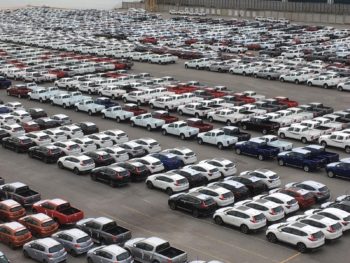Cox Automotive revises 2023 UK new car market forecast downward
Cox Automotive has adjusted its quarterly and 2023 full-year new car market forecasts downward by 7-15%, warning of the ongoing headwinds facing UK automotive.

Cox added the caveat that supply has improved marginally this year, particularly for specific makes and models
The auto services organisation said the sector continued to be hit by issues such as the post-pandemic recovery, the war in Ukraine, and the emergence of new and aggressive market entrants, such as from China.
Its new UK automotive forecasts, revealed in the latest issue of its quarterly AutoFocus digital mag, set out an upside, baseline and downside scenario for 2023.
Its upside scenario predicts the year will end on 1.77 million registrations, a 15.6% increase year-on-year, down 23.1% compared to the 2000-2019 average, and down 23.1% compared with the most recent pre-pandemic 2019 performance. This represents a 15% drop on the previous forecast.
The revised baseline scenario for 2023 now sees the year ending on 1.68 million registrations, 9.5% up year-on-year, 27.1% down compared to the 2000-2019 average and 27.1% down on the most recent pre-pandemic 2019 performance. This is a 10% downgrade on the previous forecast.
It’s also downgraded the worst-case scenario for the year by 7%. The company now expects 1.55 million registrations, a 1.3% increase year-on-year, 32.6% down compared to the 2000-2019 average, and 32.6% down compared to the most recent pre-pandemic 2019 performance.
Cox said the downturns were the result of production line shutdowns, part shortages and global supply chain disruptions caused by the pandemic.
Its data has already revealed there were 31 million fewer cars produced in the two years following the global lockdown than in the same period before. It now says this is set to rise to closer to 40 million over three years – if not more.
Philip Nothard, insight & strategy director at Cox Automotive, explained: “It was previously predicted – or hoped – that the production of new vehicles would return to normality by the end of 2022. But unfortunately, many manufacturers indicate this won’t be the case until at least the second or third quarter of 2023. This a worrying thought, but I should caveat that supply has improved marginally this year, particularly for specific makes and models, and that manufacturers continue to find new ways to source the vital materials they need to drive supply up.”
Alongside the pandemic, the political and economic turbulence from the war in Ukraine has also brought shockwaves for supply chains and the global economy.
Nothard also noted China’s influence in Europe, commenting: “Chinese brands continue to gain a strong foothold in the UK, and it’s only a matter of time before they become a significant presence in terms of sales. China is already the world’s largest body of the electric vehicle market, with over 1.3 million units sold annually, representing 40% of sales worldwide.
“Europe, of course, is slowly moving towards a greener future. Still, for this, we will need more electric vehicle-centric manufacturers providing the clean cars legislation, and consumer demand necessitates – perhaps Chinese brands present an additional solution.”

